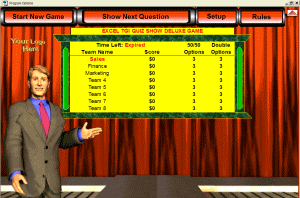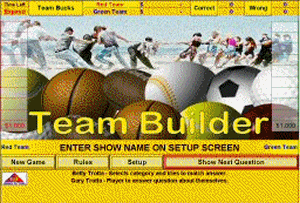Training-Games.com Issue 8 |
|
| Learning CAN be fun. Training SHOULD be fun. Training Games ARE fun! | |
In this Newsletter... |
|
Quiz Show DELUXE - Best Selling Product of 2006 |
|
  TGI´s Best selling product overall in 2006, the Quiz Show DELUXE has everything you´ll want to add fun and participation to your training program. Some features include: - Two games in one. Our traditional Quiz Show or "PERIL" a Jeopardy type game option. - Graphic Viewer allows you to show a separate image for any questions. Images can contain additional text, charts, graphs or pictures. - Team play can be set for 2 to 8 teams, and the team names appear as the game is played. - Teams can have up to 10 players per team. Player names also appear IN THE GAME! - Individual Play Option - This game can be emailed to trainees as a pre-work exercise or given to class participants as a fun way to review the course materials. What a fantastic learning enhancer! TGI Quiz Show Deluxe Single User License - $ 74.99 http://training-games.com/quizshowdeluxe.html |
|
Let´s Make A Deal! |
|
 A
great new game based on the popular television show "Deal or No Deal"
except that participants must answer your training questions to keep
the values they choose. Add this great game to your training
program! All the excitement, sounds and tough decisions of the real
game! A
great new game based on the popular television show "Deal or No Deal"
except that participants must answer your training questions to keep
the values they choose. Add this great game to your training
program! All the excitement, sounds and tough decisions of the real
game!CHOOSE THE OFFER OR THE DEAL!!!!! Full game features description go to: www.training-games.com/deal_game.html (Single User License $ 99.99) Download free game NOW! |
|
| Products From TGI Contact [email protected] or call 602-750-7223 |
|
TGI Teambuilder Game |
|
 � A great game to bring your team together, and to get to know one another � A great game to bring your team together, and to get to know one another
� Gets any program off to a great start � Players have to match likes, dislikes and opinions of the opposing team � Automated scoring and progressive scoring ladder add to the game´s strategy and excitement. Correct matches really score BIG POINTS! � Input up to 50 players � Personalize the game by naming it yourself! � 60 pre-set questions regarding player likes, dislikes and opinions � Get creative, because you can change or add questions to the game � You can even change the question categories! � Works well for NEW or ESTABLISHED teams and groups � Game rules at the touch of a button � Fun game sounds that are randomly generated � On Screen timer - You pre-set the available game time � Single License only $24.99 This game is packed with great features |
|
Training Myths |
|
|
I thought I might continue with one of the training myths that Keeps and Stolovich point to in Telling Ain't Training. One myth, especially prevalent in our fast moving, highly technical society is: "All other things being equal media provides a major difference in learning effectiveness." In 1913, Thomas Edison predicted the demise of traditional teaching with the advent of "Moving Pictures". In the 1960s, educators believed television would usher in a new and revolutionary way to teach and train. Then in the 1980s, we became convinced that computers would hold the key to better, faster and quicker ways to train. All these things have in their own way added to our ability to train, however the overall effectiveness of our training has not really improved with the addition of the latest technologies. Now we have the internet, literally all the knowledge in the World availed to us. Companies have their own LMS or Learning Management Systems which are being hailed as the latest and greatest way to "train up" your organization. Ideally training via the web can provide learners an interactive learning experience by offering discussion forums, online chartrooms, and automated multiple choice quizzes and questionnaires, but unfortunately many such systems are simply glorified document repositories. The scary part is that they are so cost effective. Training has always been most venerable to the corporate bottom line, and so the organization may be too willing to settle for a flashy, new, economical but really not very effective training delivery method. I can recall when voice mail was first introduced. I remember thinking to myself what a wonderful advancement. Communicating, I believed, would be as easy as just dialing and dropping a message. Every one would be "In the loop". My feeling was that my company would certainly be so much more productive. Years later however, with voice mail firmly entrenched in my organization, it appeared as if the benefits I fully expected were never realized. In fact, I, as many do, don´t really like voice mail today. It seems we now never get to speak to a real person and the time spent listening to meaningless messages negates any of the promised benefits... It is really not the fault of technology but our fault. Because even if external information delivery systems have changed, we have not! We pretty much learn the same way we did thousands of years ago. I am a bit annoyed with companies that force employees to get on-line and wade through immense amounts of company policy and procedure, effectively forcing huge amounts of rote memorization just so they might stamp another one "TRAINED". People need to be motivated to learn. Trainers play an important role here. Training is an art as well as a science. You need to capture the learner´s attention. Having someone read a computer screen is naturally about as effective as having them read a book (the old fashioned information delivery system). Training retention is still going to be about the same: 5 – 10 percent. Our brains are extremely efficient information filters. We are constantly being bombarded with new sensory stimuli, and our very survival depends on us paying attention to the ones we determine are important and disregarding the rest. If you think about it, it is not a problem of providing more information, but more a concern with presenting the information so that it might be assimilated into the learner´s knowledge base. This is why it is important to consider multi-sensory training methods, right and left brain teaching techniques, collaborative learning environments, and things that will help the learner stay focused (attending), intellectually engaged (thinking) and learn. Plainly said, information availability is not an adequate substitute for good instructional design. Simply providing the information is not going to induce learning. People need to be motivated to learn. I'd put my money on the motivated individual working in the local library building more synapses than the unmotivated Harvard student. Trainers need to engage students, to interest them and then challenge them to learn. It is no wonder that bigger, better, and more technically advanced media information delivery systems have not translated into more effective learning. |
|
What´s New at TGI? |
|
Four reasons to try and buy TGI products:
|
|
Famous Quotes |
|
| "Learning is not attained by chance; it must be sought for with ardor and attended to with diligence." —Abigail Adams (1744 - 1818), 1780 "We learn by example and by direct experience because there are real limits to the adequacy of verbal instruction." —Malcolm Gladwell, Blink: The Power of Thinking Without Thinking, 2005 |
|
| Visit our Website at www.training-games.com Download the TGI Catalog |
|
| Training Games Inc. Gary Trotta, CEO 4545 E Hedgehog Pl Cave Creek, AZ 85331 602-750-7223 [email protected] www.Training-Games.com |
|
| PS.. The sole intention of this email is to introduce you to our company and our products. If you do not want to receive ANY future emails from TGI, please CLICK HERE to REMOVE your email address. We respect your privacy and believe in keeping the Web a wonderful place for all. |
|
| © Copyright 2007. Training Games Inc. |